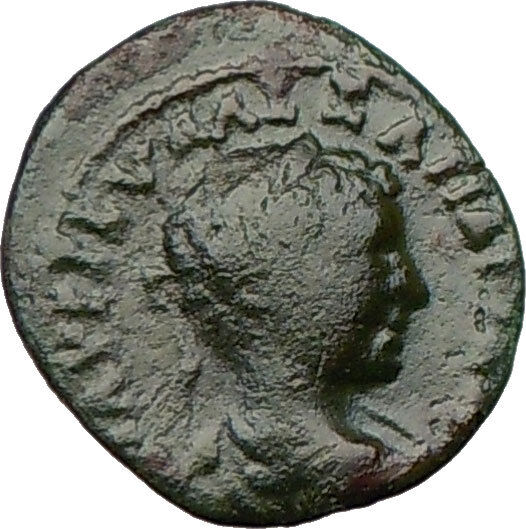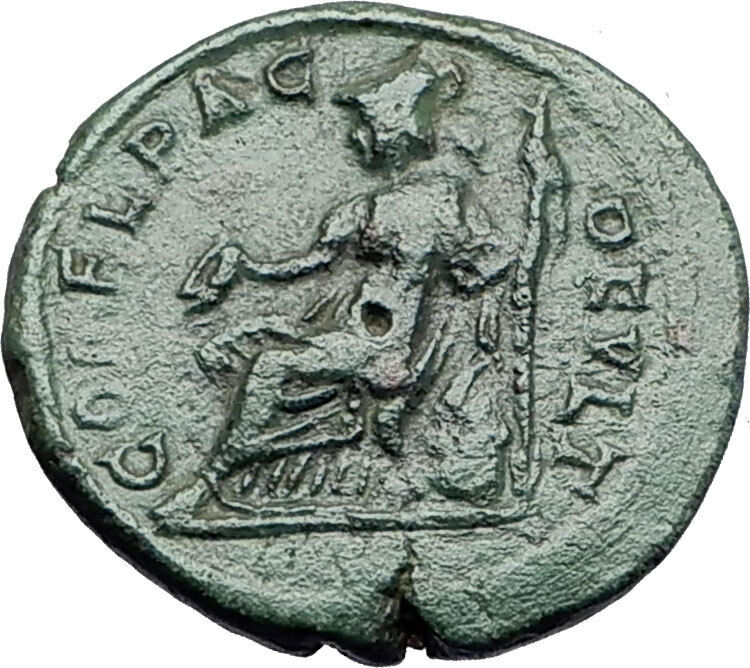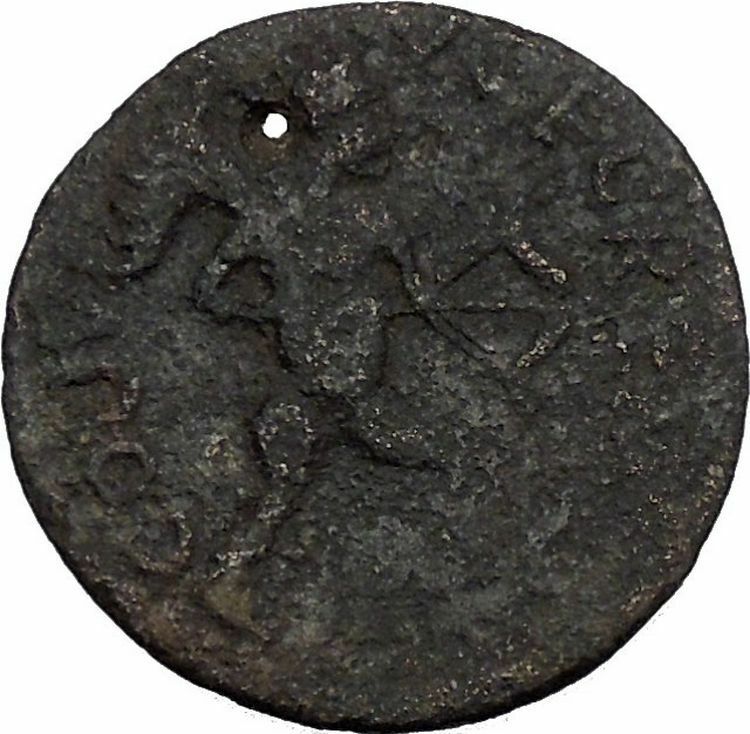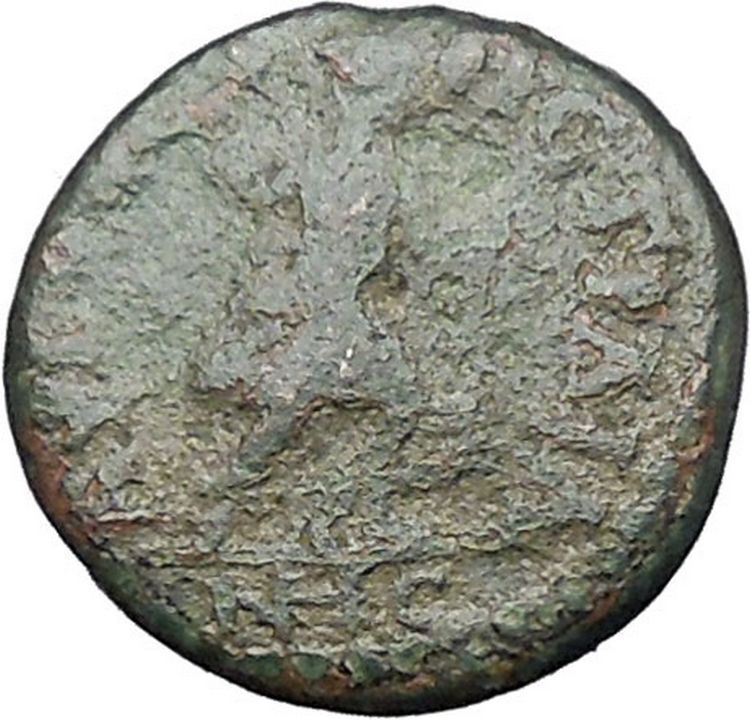|
Severus Alexander – Roman Emperor: 222-235 A.D. –
Bronze 21mm (5.08 grams) Struck in the Roman Provincial city of Nicaea in
Bythinia 193-211 A.D.
Reference: Rec Gen 617.
M AVP KAI CEVN AΛEΞANΔPOC, laureate, draped
and suiressed bust right.
NIKAIEΩN between and below three legionary standards, with wreaths above.
You are bidding on the exact item pictured,
provided with a Certificate of Authenticity and Lifetime Guarantee of
Authenticity.
The place Nicaea in Bythinia is said to have been colonized by
Bottiaeans
,
and to have originally borne the name of Ancore (Steph.
B. s. v.) or Helicore (Geogr. Min. p. 40, ed. Hudson); but it was
subsequently destroyed by the
Mysians
. A
few years after the death of
Alexander the Great
,
Macedonian
king
Antigonus
— who had taken control of much of
Asia Minor
upon the death of Alexander (under whom Antigonus had served as a
general) — probably after his victory over
Eumenes
, in
316 BC, rebuilt the town, and called it, after himself, Antigoneia (Greek:
Αντιγόνεια). (Steph. B. l. c.; Eustath. ad
Horn. II. ii. 863) Several other of Alexander’s generals (known together as the
Diadochi
(Latin; original Greek
DiadokhoiΔιάδοχοι/
“successors”)) later conspired to remove Antigonus, and after defeating him the
area was given to
Thessalian
general Lysimachus
(Lysimakhos) (circa 355 BC-281 BC) in 301 BC as his share
of the lands. He renamed it Nicaea (Greek:
Νίκαια
, also
transliterated
as Nikaia or Nicæa; see also
List of traditional Greek place names
), in tribute to his wife Nicaea, a
daughter of Antipater
. (Steph. B., Eustath., Strab., ll. cc.) According to another
account (Memnon, ap. Phot. Cod. 224. p. 233, ed. Bekker), Nicaea was founded by
men from
Nicaea
near
Thermopylae
, who had served in the army of Alexander the Great. The town was
built with great regularity, in the form of a square, measuring 16 stadia in
circumference; it had four gates, and all its streets intersected one another at
right angles, so that from a monument in the centre all the four gates could be
seen. (Strabo
xii. pp. 565 et seq.) This monument stood in the gymnasium, which was
destroyed by fire, but was restored with increased magnificence by the
younger Pliny
(Epist. x. 48), when he was governor of
Bithynia
.
The city was built on an important crossroads between
Galatia
and
Phrygia
, and
thus saw steady trade. Soon after the time of Lysimachus, Nicaea became a city
of great importance, and the kings of Bithynia, whose era begins in 288 BC with
Zipoetes
, often resided at Nicaea. It has already been mentioned that in the
time of Strabo it is called the metropolis of Bithynia, an honour which is also
assigned to it on some coins, though in later times it was enjoyed by
Nicomedia
.
The two cities, in fact, kept up a long and vehement dispute about the
precedence, and the 38th oration of
Dio
Chrysostomus
was expressly composed to settle the dispute. From this
oration, it appears that Nicomedia alone had a right to the title of metropolis,
but both were the first cities of the country.
The younger Pliny makes frequent mention of Nicaea and its public buildings,
which he undertook to restore when governor of Bithynia. (Epist. x. 40, 48,
etc.) It was the birthplace of the astronomer
Hipparchus
(ca. 194 BC), the mathematician and astronomer
Sporus
(ca. 240) and the historian
Dio Cassius
(ca. 165).
It was the death-place of the comedian
Philistion
. The numerous coins of Nicaea which still exist attest the
interest taken in the city by the emperors, as well as its attachment to the
rulers; many of them commemorate great festivals celebrated there in honour of
gods and emperors, as Olympia, Isthmia, Dionysia, Pythia, Commodia, Severia,
Philadelphia, etc. Throughout the imperial period, Nicaea remained an important
town; for its situation was particularly favourable, being only 40 km (25 mi)
distant from Prusa
(Pliny
v. 32), and 70 km (43 mi) from
Constantinople
. (It.
Ant. p. 141.) When Constantinople became the capital of the
Eastern Empire
, Nicaea did not lose in importance; for its present walls,
which were erected during the last period of the Empire, enclose a much greater
space than that ascribed to the place in the time of Strabo. Much of the
existing architecture and defensive works date to this time, early 300s.
Nicaea suffered much from earthquakes in 358, 362 and 368; after the last of
which, it was restored by the emperor
Valens
. During
the Middle Ages it was for a long time a strong bulwark of the
Byzantine
emperors against the
Turks
.
Nicaea
in early Christianity
In the reign of
Constantine
, 325, the celebrated
First Council of Nicaea
was held there against the
Arian
heresy
, and the
prelates there defined more clearly the concept of the
Trinity
and
drew up the
Nicene
Creed
. The doctrine
of the Trinity was finalized at the Council of Constantinople in
381 AD which expressly included the Holy Ghost as equal to the Father and the
Son. The first Nicene Council was probably held in what would become the now
ruined mosque of Orchan. The church of Hagia Sophia was built by
Justinian
I
in the middle of the city in the 6th century (modelled after the larger
Hagia
Sophia
in Constantinople), and it was there that the
Second Council of Nicaea
met in 787 to discuss the issues of
iconography
.
SEVERUS ALEXANDER
 Augustus: Augustus:
A.D. 222-235
Caesar: A.D. 221-222 under Elagabalus
Son of Julia Mamaea
Husband of Orbiana
Grandson of Julia Maesa
Nephew of Julia Soaemias
Cousin of Elagabalus
Second-cousin of Caracalla and Geta
Great-newphew of Septimius Severus and Julia Domna
Marcus
Aurelius Severus Alexander (October 1, 208–March 18, 235 AD), commonly
called Alexander Severus, was the last
Roman emperor
(11 March 222–235) of the
Severan dynasty
. Alexander Severus succeeded his cousin,
Elagabalus
upon the latter’s assassination in 222 AD, and was ultimately assassinated
himself, marking the
epoch event
for the
Crisis of the Third Century
—nearly fifty years of disorder, Roman civil
wars, economic chaos, regional rebellions, and external threats that brought the
Empire to near-collapse.
Alexander Severus was the
heir
apparent
to his cousin, the eighteen-year-old Emperor who had been murdered
along with his mother by his own guards—and as a mark of contempt, had their
remains cast into the
Tiber river
. He and his cousin were both grandsons of the influential and
powerful Julia Maesa
, who had arranged for Elagabalus’ acclamation as Emperor by the
famed
Third Gallic Legion
.
A rumor of Alexander’s death circulated, triggering the assassination of
Elagabalus.
Alexander’s reign was marked by troubles. In military conflict against the
rising
Sassanid Empire
, there are mixed accounts, though the Sassanid threat was
checked. However, when campaigning against
Germanic tribes
of
Germania
,
Alexander Severus apparently alienated his legions by trying diplomacy and
bribery, and they assassinated him.
Life
Alexander was born with the name Marcus Julius Gessius Bassianus Alexianus.
Alexander’s father,
Marcus Julius Gessius Marcianus
was a Syrian
Promagistrate
. His mother
Julia Avita Mamaea
was the second daughter of
Julia
Maesa
and Syrian noble
Julius Avitus
and maternal aunt of Emperor
Elagabalus
.
He had an elder sister called Theoclia and little is known about her.
Alexander’s maternal great-aunt was empress
Julia
Domna
(also Maesa’s younger sister) and his great-uncle in marriage was
emperor Lucius
Septimius Severus
. Emperors
Caracalla
and
Publius Septimius Geta
, were his mother’s maternal cousins. In 221,
Alexander’s grandmother, Maesa, persuaded the emperor to adopt his cousin as
successor and make him
Caesar
and Bassianus changed his name to Alexander. In the following
year, on March 11, Elagabalus was murdered, and Alexander was proclaimed emperor
by the
Praetorians
and accepted by the Senate.
When Alexander became emperor, he was young, amiable, well-meaning, and
entirely under the dominion of his mother. Julia Mamaea was a woman of many
virtues, and she surrounded the young emperor with wise counsellors. She watched
over the development of her son’s character and improved the tone of the
administration. On the other hand, she was inordinately jealous. She also
alienated the army by extreme parsimony, and neither she nor her son were strong
enough to impose military discipline. Mutinies became frequent in all parts of
the empire; to one of them the life of the jurist and praetorian praefect
Ulpian
was
sacrificed; another compelled the retirement of
Cassius
Dio
from his command.
On the whole, however, the reign of Alexander was prosperous until the rise,
in the east, of the
Sassanids
. Of the war that followed there are various accounts. (Mommsen
leans to that which is least favourable to the Romans). According to Alexander’s
own dispatch to the senate, he gained great victories. At all events, though the
Sassanids were checked for the time, the conduct of the Roman army showed an
extraordinary lack of discipline. The emperor returned to
Rome and celebrated
a triumph in 233.
The following year he was called to face German invaders in
Gaul, who had
breached the Rhine frontier in several places, destroying forts and over-running
the countryside. Alexander mustered his forces, bringing legions from the
eastern provinces, and crossed the Rhine into Germany on a pontoon bridge.
Initially he attempted to buy the German tribes off, so as to gain time. Whether
this was a wise policy or not, it caused the Roman legionaries to look down on
their emperor as one who was prepared to commit unsoldierly conduct.
Herodian
says “in their opinion Alexander showed no honourable intention to pursue the
war and preferred a life of ease, when he should have marched out to punish the
Germans for their previous insolence”. These circumstances drove the army to
look for a new leader. They chose
Gaius Iulius Verus Maximinus
, a Thracian soldier who had worked his way up
through the ranks.
Following the nomination of Maximinus as emperor, Alexander was slain (on
either March 18 or March 19, 235), together with his mother, in a mutiny of the
Primigenia Legio XXII
. These assassinations secured the throne for
Maximinus.
The death of Alexander is considered as the end of the Principate
system established by
Augustus
.
Although the Principate continued in theory until the reign of
Diocletian
,
Alexander Severus’ death signalled the beginning of the chaotic period known as
the
Crisis of the Third Century
which weakened the empire considerably.
Legacy
Alexander was the last of the Syrian emperors. Under the influence of his
mother, he did much to improve the morals and condition of the people. His
advisers were men like the famous jurist Ulpian, the historian Cassius Dio and a
select board of sixteen senators; a municipal council of fourteen assisted the
urban praefect in administering the affairs of the fourteen districts of Rome.
The luxury and extravagance that had formerly been so prevalent at the court
were put down; the standard of the coinage was raised; taxes were lightened;
literature, art and science were encouraged; the lot of the soldiers was
improved; and, for the convenience of the people, loan offices were instituted
for lending money at a moderate rate of interest.
In religious matters Alexander preserved an open mind. It is said that he was
desirous of erecting a temple to the
founder of
Christianity
, but was dissuaded by the pagan priests.
Marriage
Alexander was married three times. His most famous wife was
Sallustia Orbiana
,
Augusta
, whom he married in 225. He divorced and exiled her in 227,
after her father,
Seius Sallustius
, was executed for attempting to assassinate the emperor.
Another wife was Sulpicia Memmia. Her father was a man of consular rank; her
grandfather’s name was Catulus.
|





 Augustus:
Augustus:


